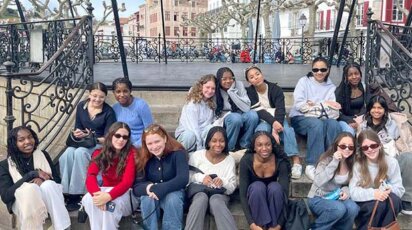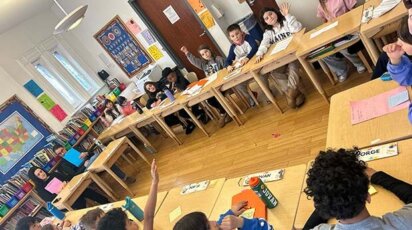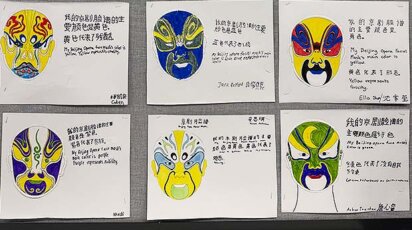News
The Kastendieck Lecture: A Harmonious Tale of Music and Environment
“It is a tale of greed being tamed by forging strong loving relationships, a tale of inequity being righted by the reality of all being in the same boat.” – Jennifer Nelson P’12, ’14, ’19, Lower School Music Teacher
Last spring, Grade 4 students shuffled into the Joseph Dana Library in a line next to the podium where Lower School music teacher Jennifer Nelson P’12, ’14, ’19 stood close by at the piano, ready and smiling for the lecture’s finale. Audience members noted the students donned forest fairytale masks and props, namely the wolf mask with a long snout and a hairy fingerless glove, while all students stood together with sheets of practiced music. With Nelson at the piano, students sang the original song, “We Go Together Like…,” an upbeat song that found its way into their Grade 4 music class as a spontaneous moment of sharing between teacher and students, and due to their collective excitement, became a song they sang together daily at the class’s request, with one student even creating a verse to add to the song. This moment illustrates the organic way that even Poly’s youngest students, guided by genuine curiosity, are inspired to be leaders of learning in the classroom.
A Poly Professional Development Tradition
The Kastendieck lecture series is named after a former head of the English Department and educator at Poly for 50 years, Dr. Miles Kastendieck. Earning his PhD in Music from Yale, Kastendieck “moonlighted as a music critic alongside his teaching gig,” shared Nelson, underscoring the connected history between academic departments at Poly, particularly literature and music, and the tether of inspiration the two mediums often find in one another–both documented artfully on the page.
A Poly tradition, Kastendieck lectures are made possible through an institutional grant awarded to faculty to advance their professional learning. The lecture series provides faculty members an opportunity to dedicate time and deepen their studies of a particular topic within their discipline. It is through this series that an intellectual exchange occurs outside of the classroom and within the larger community. It is in the spirit of continued academic exploration by our faculty that advances a world-class education of academic rigor and intellectual curiosity in our classrooms. It helps instill a thirst for learning in our students.
Jennifer Nelson’s Kastendieck Lecture
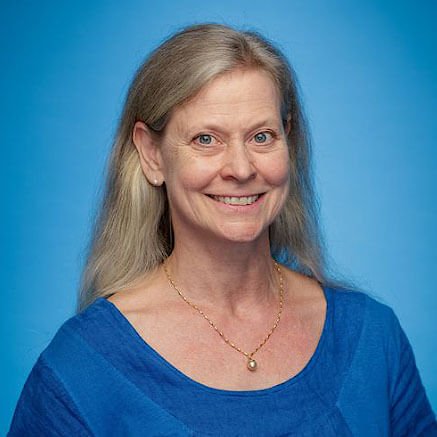
For over 25 years, Jennifer Nelson has been teaching students at the Lower School to play music and sing joyfully from their hearts. She is a dedicated educator who continues to pursue learning and practice from a place of passion and curiosity that is evidenced by all who have witnessed her teaching. On May 9, 2024, Nelson presented her Kastendieck lecture, “The Rain Spirit: The Making of a New Musical Based on Theodor Storm’s 19th-Century Fable of Greed, Courage, and Environmental Change,” a culmination of research, reflection, and musical innovation, based on a German environmental folktale against greed and destruction of nature.
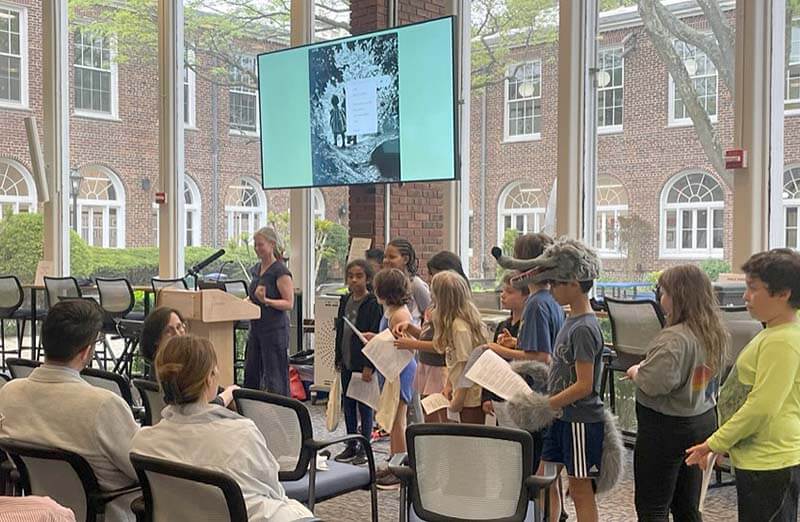
In her presentation, Nelson describes her imaginative musical composed of fourteen solos, duets, and choruses, based on Theodor Storm’s “Die Regentrude” and offers insight into the writer and his work. Theodor Storm, a German writer and founder of literary realism, imbued his writing with “childhood nostalgia for the North Sea” and environmentalism, incorporating supernatural elements. Writers of literary realism, defined as “the accurate, detailed, unembellished depiction of nature or of contemporary life,” by Brittanica, presents the familiar, everyday parts of life as they are, though often affectionately. “He uses the setting of a primeval North German coast to saturate the story with its disconcerting, superstitious atmosphere, and sounds out an underlying theme for the relationship of nature and humanity being inseparable: the sea and land embrace one another,” Nelson told the audience.
The idea that nature and humanity are inseparable, and that humans should for this reason regard the environment with a sense of protection, love, and respect (as we would a loved one), finds its way to the center of Nelson’s unfolding musical and the original music, libretto, and orchestration that accompanies it. The story of her musical is one of restoration, hope, and balance. “It is a tale of greed being tamed by forging strong loving relationships, a tale of inequity being righted by the reality of all being in the same boat,” she shared. “It’s a story of the exploitation of nature being put back into balance through regained respect and awe.”
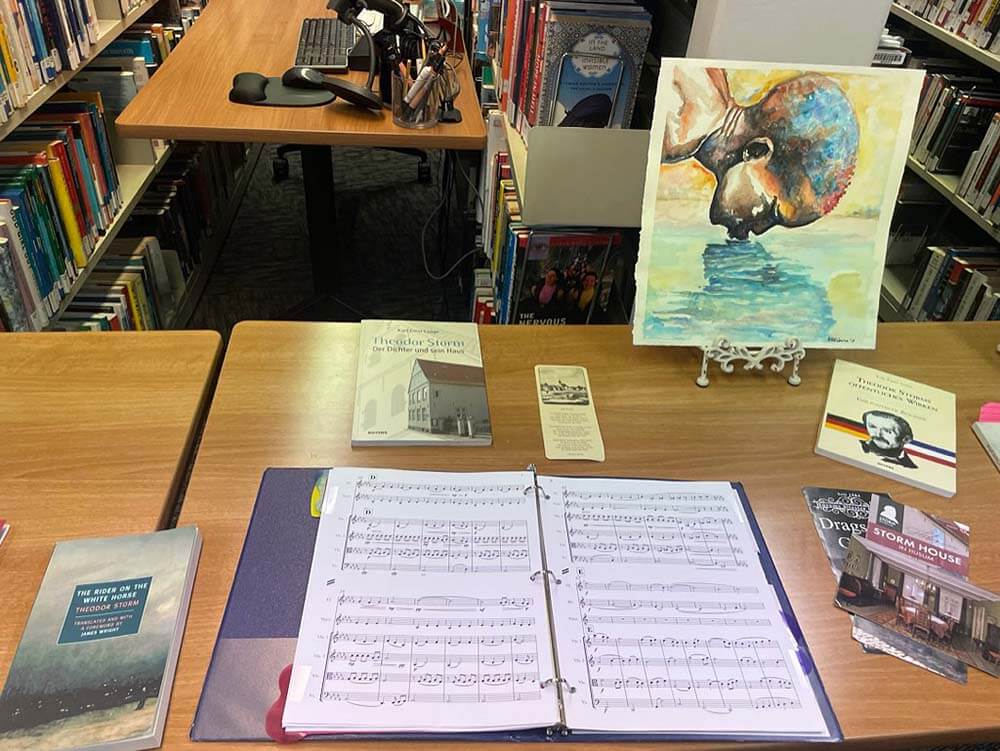
The talk was also both communal and personal. Nelson shared the interpretations of the fairy tale by other artists as well as intimate pictures of family life that helped illustrate Nelson’s lifelong connection to nature. The presentation also described her international journey to create the project. Closer to home, it included visual art by fellow Lower School faculty member Olugbala Williams that reflected the essence of Nelson’s project and its connection to Die Regentrude: that a unified respect and love for nature necessitates our sustained existence, with water as a protected life source.
What is “Die Regentrude?”
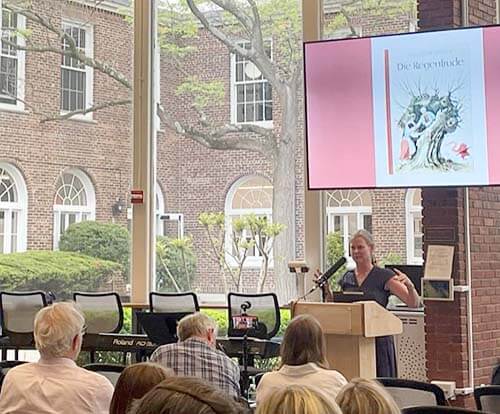
From Nelson’s lecture, she shares: “The plot is simple really: a small farming village is stricken by a drought that seems to have no end, destroying its crops and livestock. To save the land, someone must awaken the rain spirit, a magical being who has fallen asleep because the people have forgotten her song. A young girl named Maren sets out with her betrothed, Andrees, to wake her up, while ignoring a very destructive Firesprite. Die Regentrude is an environmental parable a century and a half before its time. It touches on issues of greed, inequity, and the exploitation of nature and their devastating effect on communities.”
Other Recent Diverse Lectures by Poly Faculty
Other academic lectures that debuted in spring 2024 were Upper School English faculty member Sean Mullin’s Kastendieck Lecture, titled “Poetry Beheads Football: An Apology for Literature,” an exploration of the navigation of issues of identity and literary authority, and Upper School Science faculty member Matt Futterman’s Livingston Lecture titled “Method for Magnetically Modifying and Actuating Paint with Arduino,” on his work to develop a paint that can be moved on a canvas via an external control system.
Upcoming 2025 Lectures
Always inspiring, original work by our esteemed colleagues enriches our school’s intellectual landscape. In spring 2025, we look forward to this academic year’s Kastendieck Lecture titled “Ecofeminism in the Posthuman Era,” that will be delivered by World Languages faculty Maité Iracheta and the Livingston Lecture “Charming Deception: Unmasking the Hidden Toll of Narcissism,” by World Languages faculty and psychology teacher Ronald Sarcos. Details and dates for both presentations will be announced soon.

